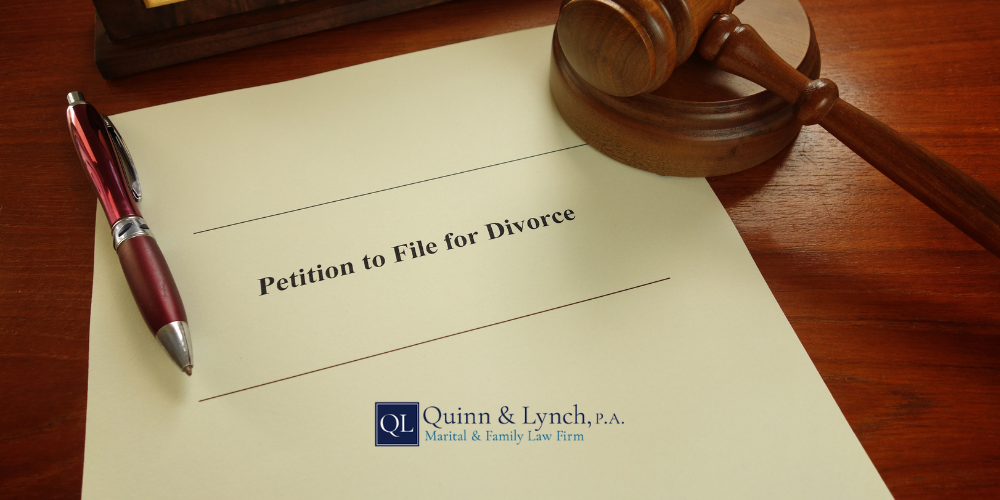Divorce In Florida
Home » How Does Divorce Work In Florida?
Practice Areas
How Does Divorce Work In Florida?

Divorce in Florida can feel overwhelming, especially if you’re unsure where to begin or what your rights are under Florida law. Whether you’re pursuing a simplified divorce or facing a contested divorce involving marital assets, child custody, and spousal support, it is important to understand how the legal process works in a no-fault divorce state.
Florida divorce laws allow either spouse to seek a dissolution of marriage by stating that the marriage is irretrievably broken. From dividing marital property and non-marital assets to arranging parenting plans and child support payments, every step in the divorce process involves decisions that affect the future and the family.
At Quinn & Lynch, P.A., our Tampa divorce attorneys provide clear guidance through each stage, from filing divorce papers to resolving issues involving alimony payments, child support, or the equitable distribution of property. Contact us today at (813) 223-7739 or complete our online form to schedule a free consultation and learn how we can help you move forward with confidence.
Understanding Florida Divorce Laws
Florida divorce laws govern how issues like child support, alimony, property division, and custody are resolved during a dissolution of marriage. Whether you are filing or responding, knowing how the court applies these laws is essential to protecting your rights throughout the divorce process.
Florida Is a No Fault Divorce State
Florida is a no-fault divorce state, which means that neither spouse is required to prove wrongdoing, adultery, or any specific reason for the dissolution of marriage. Instead, under Florida Statute § 61.052, a divorce may be granted based on either of the following grounds:
- The marriage is irretrievably broken, meaning there is no realistic chance of reconciliation; or
- One spouse has been mentally incapacitated and has already been legally declared incapacitated under Florida law for at least three years. Special notice requirements apply in these cases, and the court may appoint a guardian to represent the incapacitated spouse. Depending on the circumstances, the judge may also order the filing party to pay alimony.
This no-fault structure allows either spouse to initiate the divorce process without placing blame. The court focuses on resolving issues such as child custody, child support, spousal support, and property division rather than the cause of the marital breakdown. However, if behavior directly affects the well-being of minor/dependent children or involves financial misconduct, the judge may consider it when making related decisions.
Residency Requirements for Divorce in Florida
To file for divorce in Florida, at least one spouse must have lived in the state for at least six months before filing. Acceptable proof of residency includes a Florida driver’s license, lease agreement, utility bills, or sworn affidavits. These residency requirements must be satisfied for the court to have jurisdiction.
How to File for Divorce in Florida

The first step in the divorce process in Florida is filing a Petition for Dissolution of Marriage with the circuit court in the county where either spouse lives. Once the petitioner files the necessary documents, the other spouse must be formally served with the divorce papers.
Florida divorce law allows for two types of filings: a Simplified Dissolution of Marriage and a Regular Dissolution of Marriage. Couples pursuing an uncontested divorce may qualify for the simplified procedure, which typically involves fewer forms and a shorter timeline. A regular dissolution is required if the spouse disagrees with the divorce terms or there are unresolved matters such as property division, alimony, or child custody. The type of filing determines how the entire process unfolds and what steps must be completed before the court can finalize the divorce.
The Divorce Process in Florida

The divorce process in Florida involves a series of legal steps that begin when one spouse files a petition for the dissolution of marriage. Whether the case is an uncontested divorce or a contested divorce, the court will address key issues like child support, custody, spousal support, and property division.
Filing Divorce Papers
To start the divorce process in Florida, the petitioner files the appropriate Petition for Dissolution of Marriage with the circuit court in the county where either spouse resides. Florida requires that the paperwork be tailored to the situation, using one of the following four main petition types:
- Form 12.901(b)(1) Petition for Dissolution of Marriage with Dependent or Minor Child(ren)
- Form 12.901(b)(3) Petition for Dissolution of Marriage with No Dependent or Minor Child(ren) or Property
- Form 12.901(b)(2) Petition for Dissolution of Marriage with Property but No Dependent or Minor Child(ren)
- Form 12.901(a) Petition for Simplified Dissolution of Marriage
The initial filing must include basic information such as proof of residency, and, if applicable, a Marital Settlement Agreement. Additional documents may be required, such as a Family Law Financial Affidavit, a proposed parenting plan for child custody, and information related to child support and alimony payments.
Serving the Other Spouse
Once the divorce papers are filed, the next step in the Florida divorce process is to deliver those documents to the other spouse. This step is called service of process. Usually, a sheriff’s deputy or certified process server hand-delivers the petition and other required forms. If the spouse agrees to accept the documents, they can waive formal service by filing a written waiver with the court.
When the other spouse cannot be found despite reasonable efforts, Florida law allows for constructive service. This involves publishing a legal notice in an approved publication to notify the spouse of the pending case. If there is no response within the required timeframe, the court may issue a default judgment, allowing the dissolution of marriage to be finalized without the other spouse’s participation.
Response and Counterpetition
After being served, the other spouse, known as the respondent, has 20 days to file a response to the petition for dissolution of marriage. If the spouse disagrees with any part of the filing, they can also submit a counterpetition to outline their requests regarding divorce terms, such as property division, child custody, or spousal support.
Florida courts often require both parties to attend a case management hearing or participate in mediation early in the divorce process. These steps are designed to help resolve issues without going to trial. Because the legal process and required timelines can directly affect the outcome, it is important for both parties to have legal representation to protect their interests throughout the case.
Financial Disclosures and Discovery
Florida law requires both parties to exchange financial information within 45 days after the initial petition is served. This step, known as mandatory disclosure, includes sharing documents such as recent tax returns, pay stubs or income statements, bank records, a list of marital assets, and a completed financial affidavit. Depending on the circumstances, a short or long form affidavit is used, based on income and the case details. Providing accurate financial information helps promote transparency and allows the court to make fair decisions about alimony, child support payments, and property division during the divorce process.
Divorce Mediation
Mediation is commonly required in contested divorce cases before a trial can be scheduled. During mediation, a neutral third party helps the parties work toward a complete agreement on important divorce terms, such as child custody, spousal support, and property division, including assets like a retirement plan. Mediation can significantly reduce both time and expense.
At Quinn & Lynch, our Tampa divorce mediation attorneys help clients prepare for and participate in mediation to protect their interests and pursue practical, long-term solutions.
Finalizing the Dissolution of Marriage
If the spouses reach a complete agreement, the settlement is submitted to the court for review at a final hearing. At this hearing, the judge determines whether the terms comply with Florida law and are fair to both parties. If approved, the court issues a Final Judgment of Dissolution of Marriage, officially ending the marriage. This final step can take as little as a few months in uncontested divorce cases.
If the parties cannot agree, the case proceeds to trial, where the judge hears evidence and testimony before making final decisions on unresolved issues such as child custody, property division, and alimony.
Legal Issues Addressed in Florida Divorces

Florida divorces require the resolution of several legal issues that affect both parties’ rights and responsibilities during and after the dissolution of marriage.
Child Custody and Parenting Plans in Florida
In Florida, courts typically favor shared parental responsibility unless it is harmful to the child. Judges decide custody based on the child’s best interests, considering factors like stability, safety, and each parent’s involvement, rather than personal preferences.
Parents must create a detailed parenting plan that outlines time-sharing, decision-making authority, and daily routines. This includes school schedules, holidays, and communication between households. The non-custodial parent is generally granted meaningful visitation unless restrictions are necessary. Our Tampa child custody lawyers help parents build parenting plans that work for their families and meet all legal requirements.
Child Support in Florida
Child support in Florida is calculated using a formula that considers both parents’ income, the number of minor children, and the time-sharing arrangement outlined in the parenting plan. These payments cover basic needs such as housing, food, medical care, education, and other essential expenses.
Florida follows an income shares model, which means the court looks at both spouses’ financial resources to determine a fair amount of support. At Quinn & Lynch, our Tampa child support attorneys guide clients through every step of this process, from understanding payment obligations to requesting modifications when circumstances change.
Property Division
Florida follows the principle of equitable distribution, meaning the court divides marital property in a way that is fair, though not always equal. Marital property includes assets and debts acquired by either spouse during the marriage, such as income, real estate, vehicles, and retirement accounts. Non-marital assets, also known as separate property, generally include items owned by one spouse before the marriage, as well as inheritances and individual gifts.
The court considers several factors to determine a fair division. These include the length of the marriage, each spouse’s financial and non-financial contributions, and the current income and financial circumstances of both parties. The Tampa property division lawyers at Quinn & Lynch focus on protecting your interests and helping you achieve a result that supports your financial well-being.
Spousal Support (Alimony)
Florida courts may require one spouse to pay alimony when there is a clear difference in financial need and the other spouse’s ability to pay. The length of the marriage plays a key role in determining the type and duration of alimony payments. In cases involving a short-term marriage, which is defined as less than seven years, alimony is usually awarded for a limited period compared to longer marriages.
When determining spousal support, the court considers several factors, including:
- The standard of living established during the marriage
- Each party’s income and ability to earn
- Physical and emotional health of both spouses
- A history of domestic violence can affect both financial need and entitlement
Our Tampa alimony attorneys advocate for fair, reasonable outcomes, whether you are seeking support or defending against an unjust request.
Uncontested Divorce vs. Contested Divorce
An uncontested divorce, or simplified divorce, occurs when both parties reach a complete agreement on all issues such as parenting plans, property division, and alimony. These cases are typically resolved more quickly and with lower legal costs. A simplified divorce may be available when no minor children and limited marital assets are involved.
In contrast, a contested divorce arises when one spouse disagrees on important matters, which can lead to court hearings or even a trial. No matter the type of divorce in Florida, the attorneys at Quinn & Lynch provide steady legal guidance throughout the entire process, tailoring strategies to meet each client’s specific needs and goals.
Considering Divorce in Florida? Contact the Tampa Divorce Attorneys at Quinn & Lynch Today

If your marriage is irretrievably broken and you are uncertain about what to do next, talking with a divorce attorney can help you understand your options and protect your rights. Whether your situation involves minor children, the division of marital property, or questions about alimony, the choices you make during this time are important for your future.
At Quinn & Lynch, P.A., our Tampa divorce attorneys are here to guide you through every stage of the divorce process. Call us today at (813) 223-7739 or complete our online intake form to schedule a consultation and take the first step toward clarity and peace of mind.
Contact Our Experienced, Dedicated Divorce & Family Law Lawyers Today
As a dedicated family law practice in the Tampa Bay area, we work one on one with our clients, resulting in representation that is characterized by genuine care and understanding. If you are dealing with divorce or other family law issues, please contact at 813-223-7739 to schedule an appointment with one of our experienced family and divorce attorneys.














